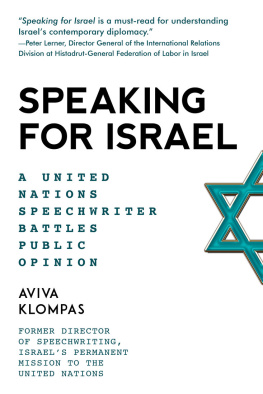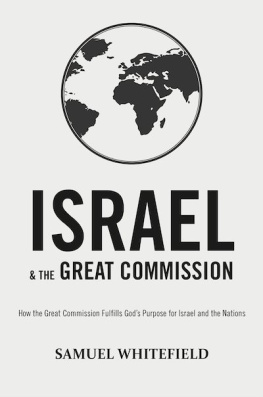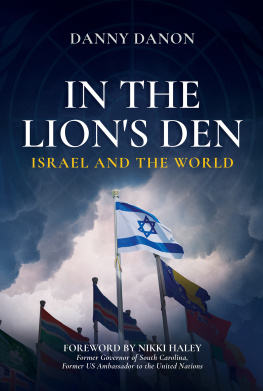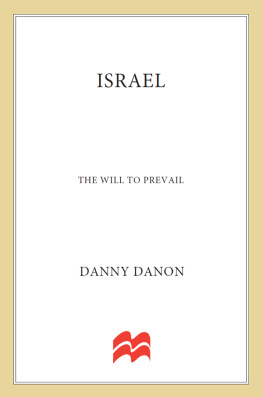

For my parents,
my first editors and lasting champions.
Copyright 2019 by Aviva Klompas
All rights reserved. No part of this book may be reproduced in any manner without the express written consent of the publisher, except in the case of brief excerpts in critical reviews or articles. All inquiries should be addressed to Skyhorse Publishing, 307 West 36th Street, 11th Floor, New York, NY 10018.
Skyhorse Publishing books may be purchased in bulk at special discounts for sales promotion, corporate gifts, fund-raising, or educational purposes. Special editions can also be created to specifications. For details, contact the Special Sales Department, Skyhorse Publishing, 307 West 36th Street, 11th Floor, New York, NY 10018 or .
Skyhorse and Skyhorse Publishing are registered trademarks of Skyhorse Publishing, Inc., a Delaware corporation.
Visit our website at www.skyhorsepublishing.com.
10 9 8 7 6 5 4 3 2 1
Library of Congress Cataloging-in-Publication Data is available on file.
Cover design by Paul Qualcom
Print ISBN: 978-1-5107-4391-5
Ebook ISBN: 978-1-5107-4392-2
Printed in the United States of America
Contents
Authors Note
This book is based on the time I spent working as the speechwriter in the Permanent Mission of Israel to the United Nations. Many names have been changed, I have taken certain liberties with the chronology and dialogue, and, with the passage of time, some circumstances are undoubtedly imperfectly remembered. I wrote this book to share a remarkable time in my life. I feel privileged to have worked alongside so many extraordinary people and am profoundly grateful for the experience. Write on.
Introduction
If I ever have the chance to meet Aaron Sorkin, I will thank him profusely. His immensely popular and critically acclaimed television series, The West Wing , seems to be responsible for the fascination and admiration surrounding speechwriters. Thanks to his show, when people learn I was the speechwriter for Israels ambassador to the United Nations, they conjure images of days spent fighting on the side of the angels, armed with witty banter and righteous certainty developed from years studying the Middle East.
Thats not my story. I grew up in Toronto, majored in zoology, and spent my early career working on domestic provincial policy issues. The diplomats and staff of Israels delegation to the United Nations werent angels. Far from it. We were people with egos and eccentricities, ambitions and attitude, fears and failings. But we shared a common purpose.
In my first week of work, one of the diplomats came bounding into my office, and in the abrupt manner of an Israeli, asked me why I would leave a calm and comfortable job in Canada to work around the clock for one of the most unpopular countries in the world. She ended her question by saying, hishtagat? which is Hebrew for , Are you crazy?
Before she came in, I had been staring dejectedly at the jam-packed speech schedule and her question did nothing to raise my spirits. It was only a few days into my new position, but I could see that working with Israelis was going to be an adjustment. My new colleagues were loud, stubborn, demanding, and had an unnerving habit of saying exactly what was on their minds.
Even so, it was a fair question. We were not shortlisted to win any popularity contests in the global body. Representing Israel at the United Nations is like volunteering to sell Boston Red Sox paraphernalia outside Yankee Stadium. It would have been bad enough to be silently scorned, but Israel, with just 0.1 percent of the worlds population and 0.004 percent of the planetary landmass, consumes an overwhelming proportion of the global bodys criticisms. My colleagues couldnt fathom why a non-Israeli would be willing to endure the stress and struggles of representing Israel in an institution notorious for its bias against the Jewish state.
The answer is that I believe Israel is more than just a country. I see it as a living testament to a small peoples ability to overcome impossible odds through the sheer force of their commitment to knowledge, freedom, and innovation. I was immensely proud to go to work each day to represent the Jewish state in one of the worlds most anti-Israel institutions. It was a remarkable time to be representing Israel on the global stage. During my tenure, I saw the collapse of four Middle Eastern states, faltering Israeli-Palestinian peace talks, waves of Palestinian terrorism, stop-and-go nuclear negotiations culminating in the Iran deal, an attempt to push Palestinian statehood through the Security Council, the Palestinians bid to join the International Criminal Court, the kidnapping and murder of three Israeli teenagersEyal, Gilad, and Naftaliand fifty days of war between Israel and Hamas in Gaza.
This book tells the story of how an aspiring evolutionary biologist from Canada became an author of Israels voice on the world stage of the United Nations.
CHAPTER 1
Yalla! / Lets go!
What do you say when you cant say no?
I had been working in the Israeli delegation to the United Nations for a few months when I was contacted by a lecturer at the New School in New York City and asked to give a presentation to her class on how to become a speechwriter. I cheerfully accepted, hung up the phone, then promptly went to find my interns and asked them to research how one becomes a speechwriter. It sounds ridiculous, but I could hardly stand up in front of a class of students and encourage them to follow in my footstepsstudy zoology in university, became a policy advisor in Canada, and then hope to get a call out of the blue from the Israeli government.
Growing up, I was not a talented writer. My parents are quick to point this out to anyone who asks if they recognized any early prodigious skills. Certainly not in the school papers we had to mark up in red ink, they share a little too eagerly. Uncertain of the career I wanted to pursue after high school, I enrolled in the University of Torontos science program. Fascinated by a first-year course on evolutionary behavior, I decided to major in zoology and minor in eighteenth-century Enlightenment history. My parents had concerns.
By my final year of college, it was clear I wasnt going to follow in the footsteps of Darwin or Herodotus, and my unusual combination of courses wasnt setting me up for steady income after graduation. My mother, a high school career counselor, wordlessly left printouts of various post-college programs with a more practical bent for me to happen upon. One caught my interest, and I enrolled in a postgraduate corporate communications program. Freed from the burden of writing long, dense academic papers, I happily discovered I was a decent writer. I decided to combine my interest in the sciences and communications and applied for a policy and communications position in a healthcare association. In the interview, Andrew, my prospective boss, asked what I believed to be my greatest weakness. Surprised by the question and unprepared with rehearsed answers like Im a workaholic or Im a perfectionist, I told him the truth, My writing could be better.
He later told me he could not believe that while interviewing for a communications job, I admitted I needed to work on my writing skills. Apparently, my obliviousness was endearing, and Andrew felt he could coach me, because he offered me the position. The job came with a promise that he and his communications team would turn me into a first-class writer. They taught me that good writing is right, tight, and bright, and set me to work drafting everything from policy briefing notes to newspaper articles to speeches for the CEO. I loved my job and adored my colleagues. Our little team encouraged good-natured fun, especially in the form of pranks. For an annual fundraiser, we held an auction of challenges for colleagues. I wagered enough to see a coworker, whose politics ran slightly to the right of the Kremlin, walk up and down Torontos bustling Front Street, wearing a sandwich board encouraging cars to honk if they loved the local liberal radio station.
Next page







